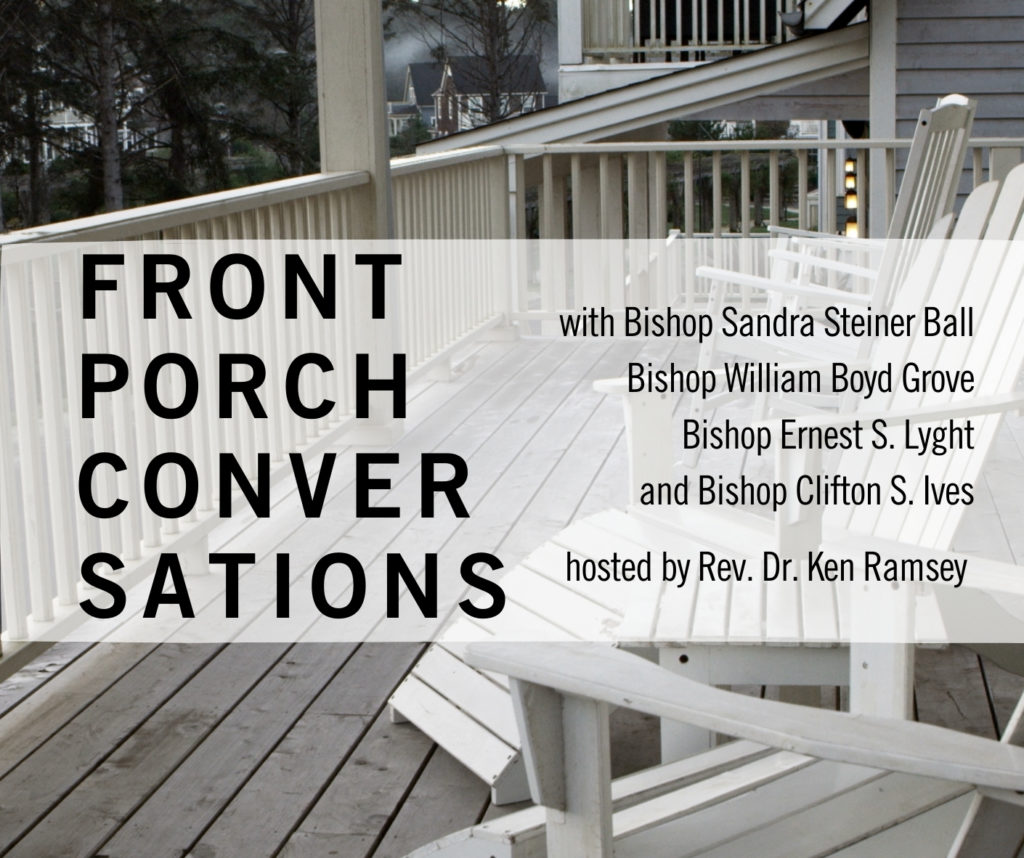On behalf of West Virginia Bishops S. Clifton Ives, William Boyd Grove, Ernest Lyght, and Sandra Steiner Ball, as well as Rev. Dr. Ken Ramsey, who helped the bishops pull this project together, it is my honor to invite you into our Conversations from the Porch. This conversation, separated into three video segments, was created out of a desire to invite individuals and congregations into a conversation that would raise our individual and collective awareness regarding racism and challenge us to the work we need to do within our own beings and in our communities to eliminate racism. 
In this, the second part of our dialogue, we rehearse and celebrate the small and sometimes large actions that have been taken over the years in the West Virginia Conference to address racism and white privilege, actions that planted seeds for a more equitable future and become signs of hope.
Action on Video 2 : Celebration
Our story as West Virginia Conference United Methodists
- What did you learn that you did not already know from listening in on this section of our conversations from the porch?
- What is it that troubled you about these conversations, and why?
- Are there places where you have witnessed seeds of hope springing up with regard to overcoming racism in your community, within your congregation, within your family?
- What seeds might we be called to sow that could grow into loving signs of justice, equality, and peace?
- Who are the persons of color we need to get to know and with whom we need to build relationships within our community?
- How and when will you have a conversation with someone of a different race or ethnic background about what soil you might till together in order to plant seeds of hope?
Suggestions for How to use this Video Series
- For Small Group Discussion – Discussion questions are posted to accompany each video. We recommend that you do not watch all three videos at once, but take them one at a time. The videos are approximately 30 minutes each.
- We realize these are a little long for some Sunday School or Book Study classes. (We are taking notes on what we will do differently if we should endeavor to record more conversations from the porch.)
- We would encourage you to utilize the renewal and reaffirmation of Baptism service that is posted on the Website with these materials at the close of your conversation and discussion in relation to the third video conversation. This service of renewal of baptism could also be a way to begin further discussions with a wider group on what steps you and your congregation might take regularly to work at writing the next chapter or story of our work in addressing racism.
Alternate Study possibility:
**Instead of making this a 3-part study, you may want to make this into a 6-part series. In Session I, Video #1 can be paused after Bishop Grove’s Story for discussion. And then in Session II, you can complete the first video by picking up where you left off to listen and then discuss what you hear from Bishop Lyght and Ives. Of course, the invitation at the end of Video 1 is to begin to share your stories and listen to other persons' stories.
**In your next meeting (Session III), Video #2 can be paused after hearing from Bishop Grove and Bishop Ives. Session IV would pick up with Bishop Lyght; however, the leader/facilitator will need to remind people of what was shared by Bishop Ives to put Bishop Lyght’s statements in context.
**If you desire to split the third video into two study components, we encourage you to pause and discuss following Bishop Lyght’s sharing for Session V, then pick up with Bishop Grove and Steiner Ball in Session VI.
As you finish this series, we would encourage you to utilize the renewal and reaffirmation of Baptism service that is posted on the Website with these materials. This service of renewal of baptism could also be a way to begin further discussions with a wider group on what steps you and your congregation might take regularly to work at writing the next chapter or story of our work in addressing racism.
This video series can also be used for individual reflection, but we invite you to space out your viewing of the videos. Reflect on the suggested discussion questions. Ponder how you will expand your conversations and discussion and with whom.
Create Safe Space for Everyone for your study and discussion.
Respectful Communication Guidelines
- R = Take RESPONSIBILITY for what you say and feel without blaming others.
- E = Use EMPATHETIC listening.
- S = Be SENSITIVE to differences in communication styles.
- P = PONDER what you hear and feel before you speak.
- E = EXAMINE your own assumptions and perceptions.
- C = Keep CONFIDENTIALITY.
- T = TRUST ambiguity because we are not here to debate who is right or wrong.
-Kaleidoscope Institute, www.kscopeinstitute.org
Process for Mutual Invitation (a process for helping discussion)
The leader designates a person to share first. After sharing, that person invites another person to then share. As each person is invited, they have three options for how to respond to the invitation to share:
- Share and invite
- Pass for now, then invite another to share. The group will remember to invite this person again later.
- Pass and invite. The group will not return to this person in this round.
Do this until everyone has been invited - or invited again for those who ‘pass for now.’
-Wolf Shall Dwell With the Lamb by Eric HF Law, www.kscopeinstitute.org